Dietetic Internship Newsletter Issue XVIII, Fall 2024
Welcome New Junior Dietetic Interns, September 2024

Letter from the Director & Assistant Director
Hello, preceptors, faculty, interns, and alumni, and welcome to the 2024 edition of the UMaine Dietetic Internship (DI) Newsletter! As the new fall semester begins, we are excited to share news and connect with you. We hope you will enjoy updates from interns, alumni, preceptors, and the program itself.
Our sincerest gratitude goes out to all of our preceptors and site coordinators for hosting our interns during their supervised practice throughout the state. Without you, our program would not be possible. We are happy to announce the addition of four new sites into our UMaine DI family; these include Auburn Public Schools, Bates College, Dorothea Dix Psychiatric Center, and Maine Veterans Home. We look forward to working with all of you!
A warm congratulations is extended to all of our interns who completed their internship over the past year (2023/2024). Graduates included Emma Denbow, Jordan Hess, Lauren Roberts, Corrine McGrath, Emma Watras, and Cait Winn. We are so proud of the outstanding dietetic professionals you have become!
Earlier this year, we had the pleasure of hosting our virtual annual site coordinator’s meeting with preceptors and site coordinators. In addition to program updates, we discussed the very latest news from the Accreditation Council for Education in Nutrition and Dietetics (ACEND) regarding the elimination of the dietetic internship match for all programs. This change does not impact any of our internship sites. We have recently begun planning an accelerated program where internal applicants (completing a DPD at UMaine) may potentially be accepted into UMaine’s MS/DI program in the junior year of their undergraduate program. This is an exciting new opportunity, and we look forward to sharing more with you in the near future.
Last but not least, we would like to acknowledge our program alumni. As past interns, you have made our program a success, and we wish you the best in all you do. Please stay in touch with us! We look forward to hearing from you and hope you will enjoy the alumni updates in this newsletter.
Thank you for your continued support of the UMaine DI Program. As always, feel free to reach out to us with any questions. Have a wonderful fall!
Warm wishes,
Mona Therrien-Genest & Julie Milan
Semi-Annual Pinning Ceremony
In December 2023 and July of 2024, we recognized UMaine’s graduating interns at the Semi-Annual Pinning Ceremony. Family, friends, and faculty gathered for the celebration. Interns received their certificate of completion and RDN pin (to be worn after passing the RDN exam). Congratulations, and thank you to all of our preceptors and faculty who support our interns!
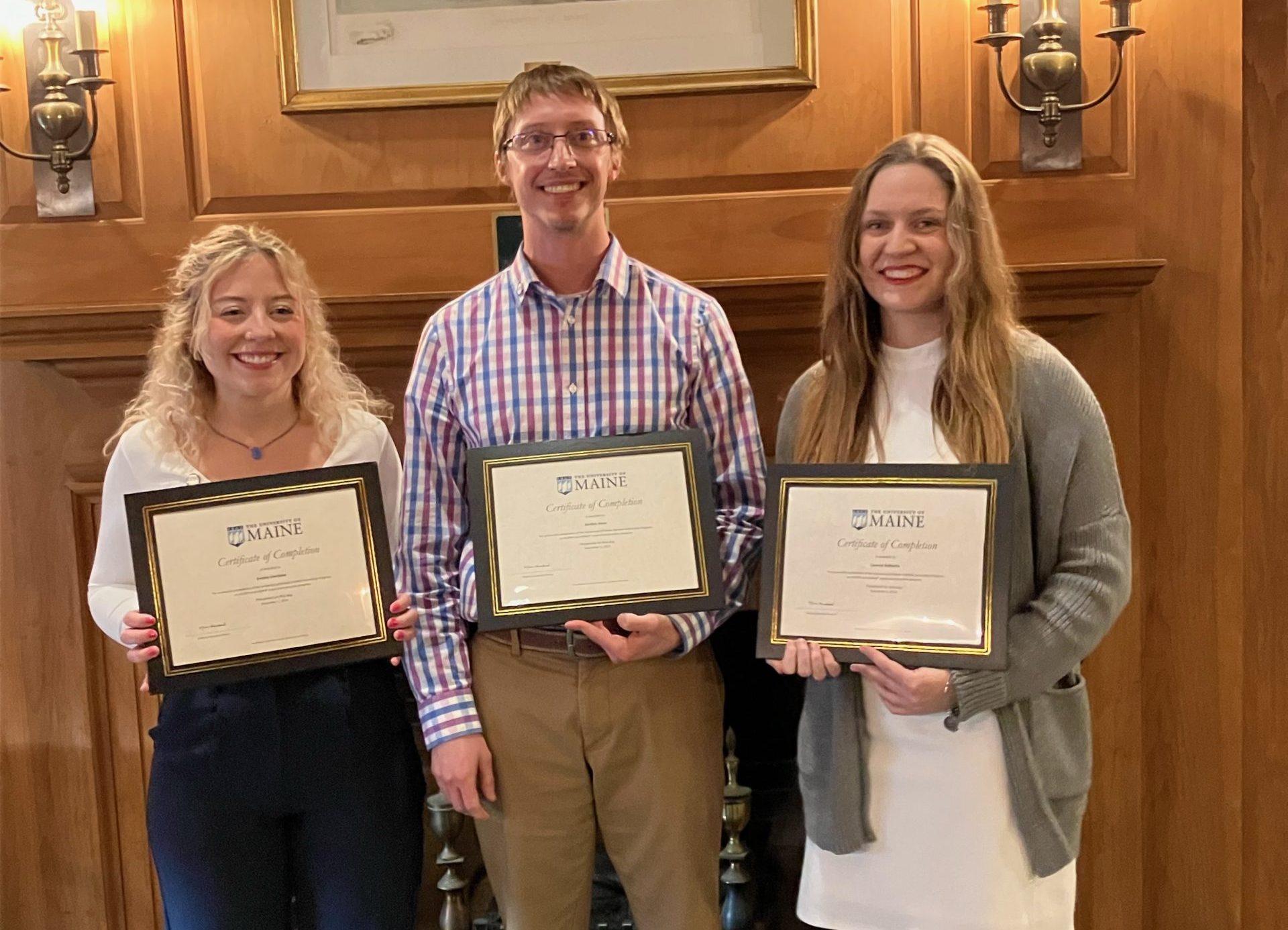

Interns in the Field
Emma Watras – Food Service Management Rotation
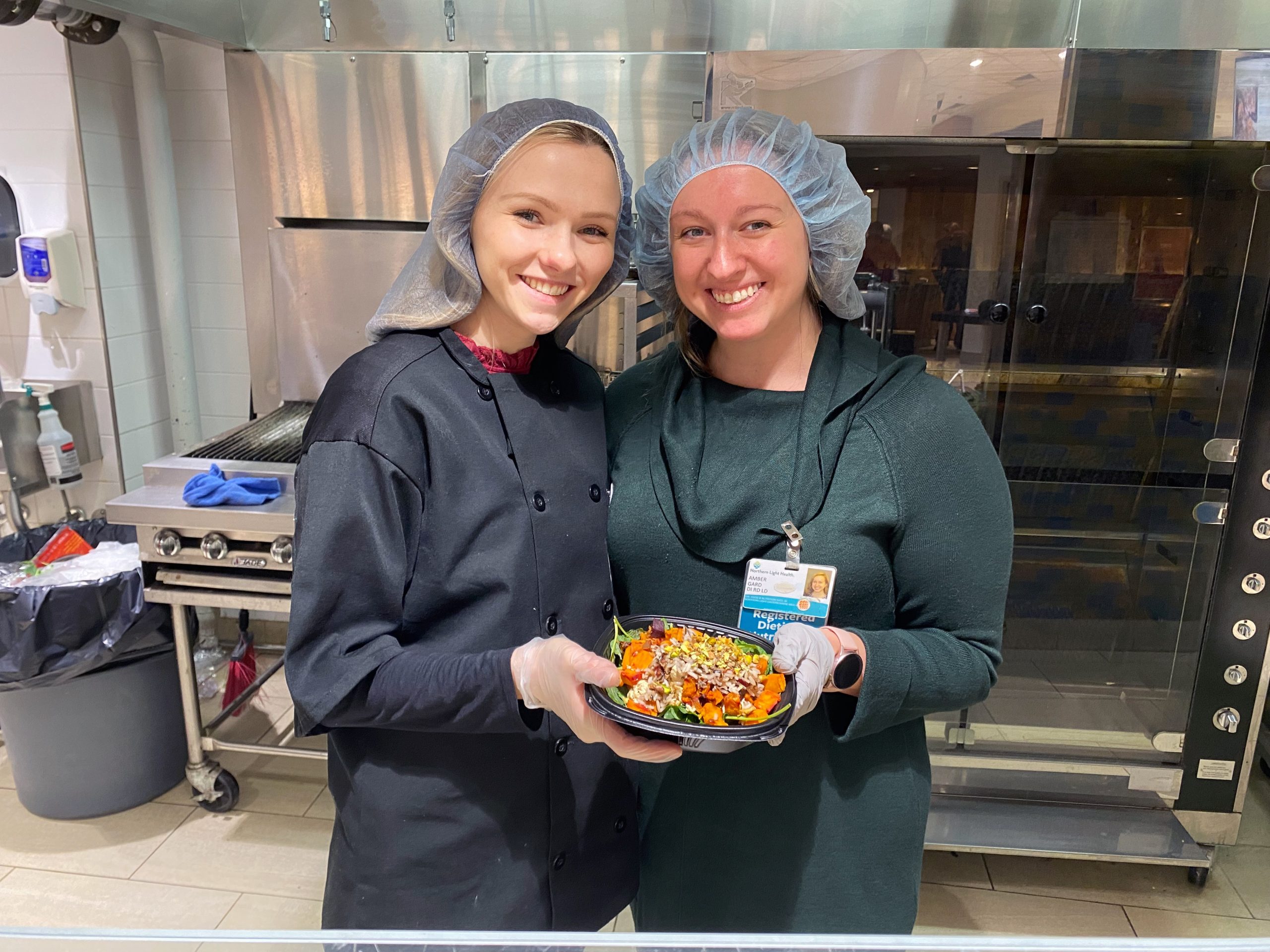
Emma Watras planned a tasty, heart-healthy meal in honor of American Heart Health Month during her food service rotation at Northern Light Eastern Maine Medical Center. Emma chose to serve a Greek Herbed Chicken and Winter Root-Vegetable Grain Bowl. She ran a nutrient analysis of the recipe, assisted in ordering the ingredients, and prepped and served the recipe in the hospital’s cafeteria. The recipe was a huge hit and sold out in 90 minutes! Pictured is Emma with her preceptor, Amber Gard, the Food and Nutrition Services Director at Northern Light Eastern Maine Medical Center.
Corrine McGrath – Clinical & Community Rotations
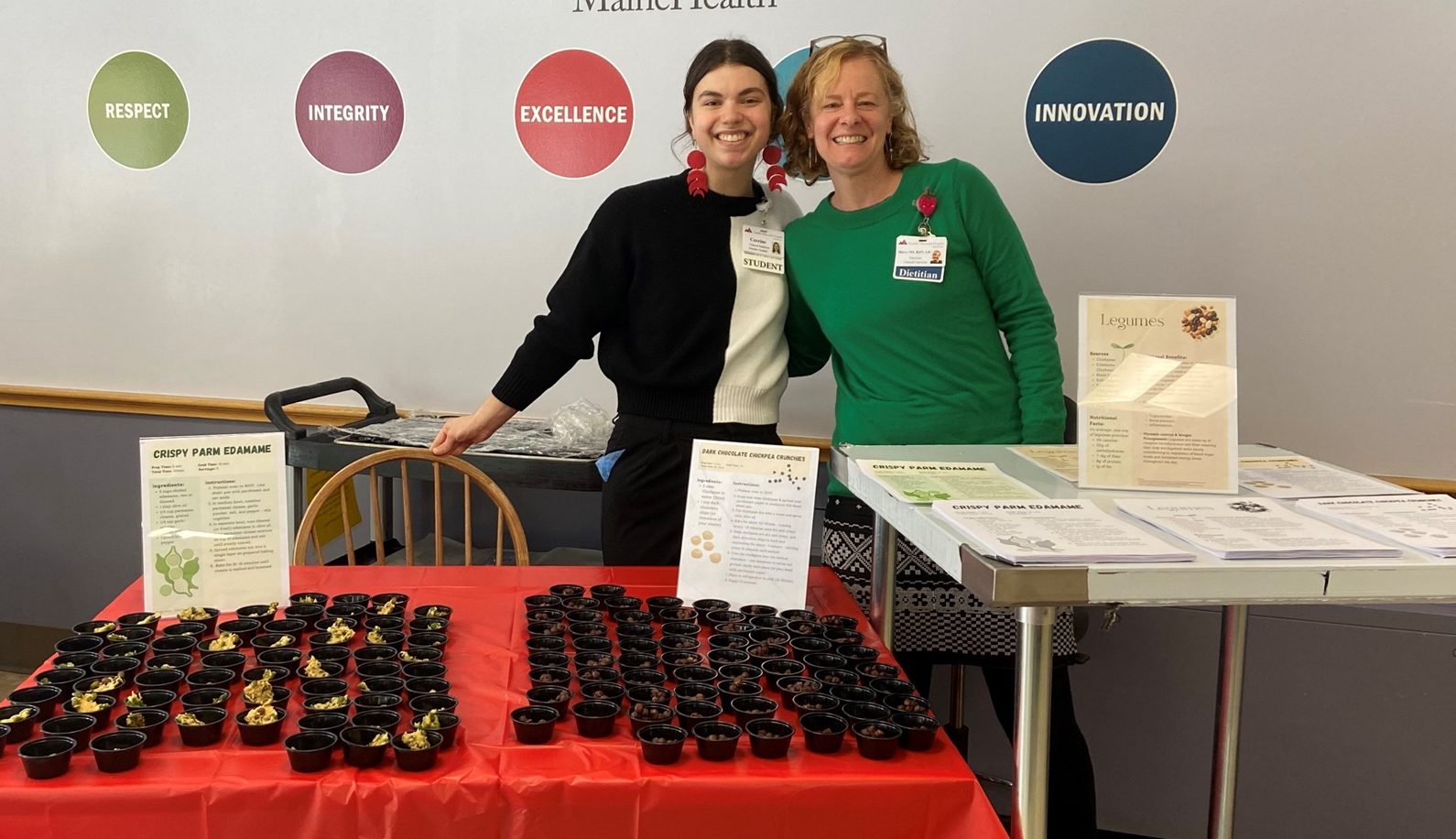
Corrine McGrath, senior dietetic intern, and preceptor Marcy Lawless at Franklin Memorial Hospital in Farmington Maine during her Clinical 1 rotation. Sampling some healthier snack options at lunch: dark chocolate chickpea crunchies and crispy parmesan edamame during National Nutrition Month.
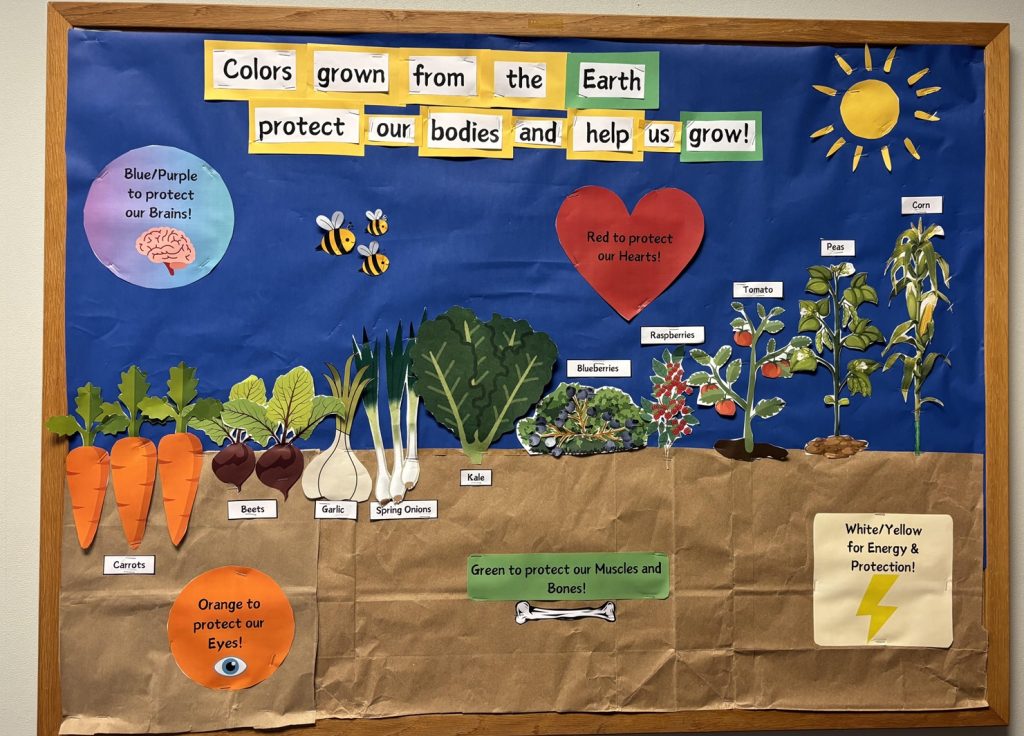
During Corrine McGrath’s community rotation at the local WIC agency in Auburn, she developed this bulletin board using farmers’ market season for inspiration to give kids a visual on how foods are grown and why colorful produce is important!
Cait Winn – Food Service Management Rotation
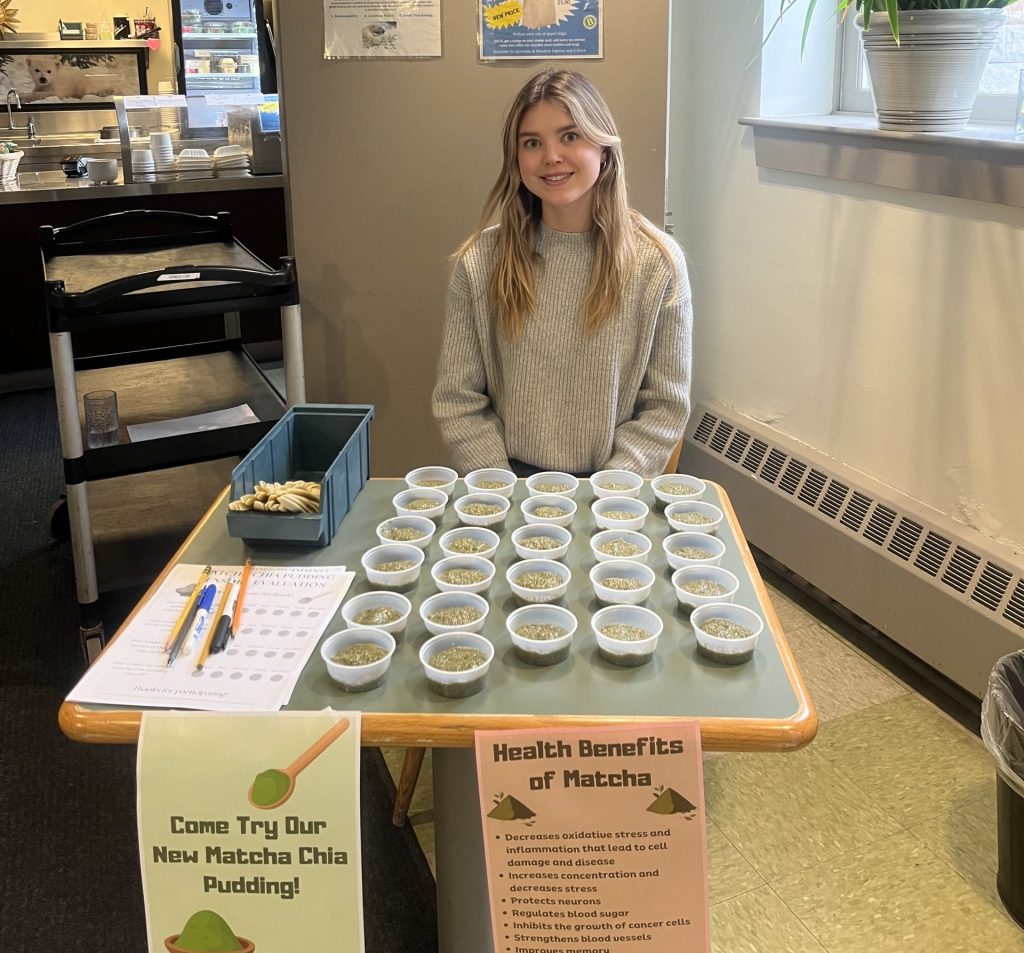
Cait Winn developed a new matcha chia pudding recipe during her food service rotation at Bowdoin College under the supervision of her preceptor, Susanne D’Angelo-Cooley (Registered Dietitian and Operations Manager).
Research Spotlight
Kayla Raymond’s Master’s Thesis

What is the topic of your research, and why did you choose to pursue this area?
My research focused on the effects of food insecurity on overall health and wellbeing in the college student population, with my thesis being titled “The Impact of Food Security Status on Health-Related Quality of Life and Diet Quality in College Students.”
I chose to pursue this topic because college students are notorious for demonstrating poor health behaviors, and throughout my college career, I witnessed the truth of this stereotype first-hand. Since the behaviors that are formed during the college years may follow an individual into adulthood and affect their risk for chronic diseases, I became interested in researching the factors that impact the health behaviors of college students. Food insecurity stood out, specifically, due to its increasing prevalence among this population.
Would you give a brief summary of your research, including some background information, methods and major findings?
Previous studies have shown college students demonstrate both poor diet quality, referring to the quality and variety of a person’s dietary pattern over time, and poor health-related quality of life (HRQOL), which refers to an individual’s perceived physical, mental, and social health and the impact that their health status has on their quality of life. Furthermore, college students are disproportionately affected by food insecurity, which has been associated with worse HRQOL and diet quality among this population.
Despite this apparent relationship between food insecurity and poor HRQOL and diet quality, there is a lack of research assessing the effects of food security status on these variables over the course of a college semester. With this in mind, the objective of my study was to explore differences in HRQOL and diet quality between food secure and food insecure college students at the beginning of a semester and how these differences change from the beginning to end of a semester. To achieve this, we recruited students from the University of Maine and the University of Kentucky to participate in an online survey that assessed food security status, HRQOL, and diet quality. The baseline survey was sent out during the second week of the Spring 2023 semester and the post-semester survey was sent out during the last week of that semester. Upon analysis of our data, we found that at baseline, food insecure students demonstrate worse HRQOL than their food secure peers, since food insecure students reported significantly worse scores on four HRQOL parameters, such as a greater number of days per month during which they felt worried, tense, or anxious. We also found a significant difference in changes in vegetable intake from baseline to post-semester based on food security status, with food insecure students reporting a decrease in vegetable intake and food secure students reporting an increase.
What are some limitations and implications for your research?
One limitation of this study was that the Adult Food Security Survey Module instrument that was used to measure food security status assesses this variable over the past 12 months. This time frame limits the ability of the instrument to accurately predict food security status in the college student population, due to their inconsistent income and housing status.
As for the implications of this research, the findings of this study justify the development of college-specific health programming that targets food insecure students, with the goals of improving both HRQOL and diet quality among this vulnerable population. Specifically, I hope that this research leads to the creation of programs that can provide food insecure students with positive coping skills, such as classes that teach students the necessary cooking and nutrition skills to improve their diet quality despite their limited economic resources.
Based on your findings and a review of the current literature, what advice or recommendations would you give to the general public?
I would advise the general public to be careful not to jump to assumptions regarding the cause of an individual’s poor health behaviors. Although society often attributes the poor diet quality or mental health behaviors demonstrated by college students to a lack of discipline or poor choices in extracurricular activities, this research demonstrates that factors such as food insecurity may be partly responsible.
I would also encourage the general public to advocate for public policy changes that address the issue of food insecurity among this population, such as an expansion of the eligibility of college students for federal assistance programs.
Have you submitted your research for publication (if so, what journal?), or are you in the process of writing an article for publication?
Although I have not had the time to do so yet, I plan to submit my thesis manuscript for publication once I complete my dietetic internship.
When do you plan to graduate? What degrees/credentials do you currently hold?
Currently, I have a bachelor’s degree in Food Science and Human Nutrition. I plan to graduate with my master’s degree in Food Science & Human Nutrition in December of 2024, following completion of my dietetic internship. I then plan on taking the CDR Exam as soon as possible to become a Registered Dietitian Nutritionist.
Public Policy Update from Kayla Parsons
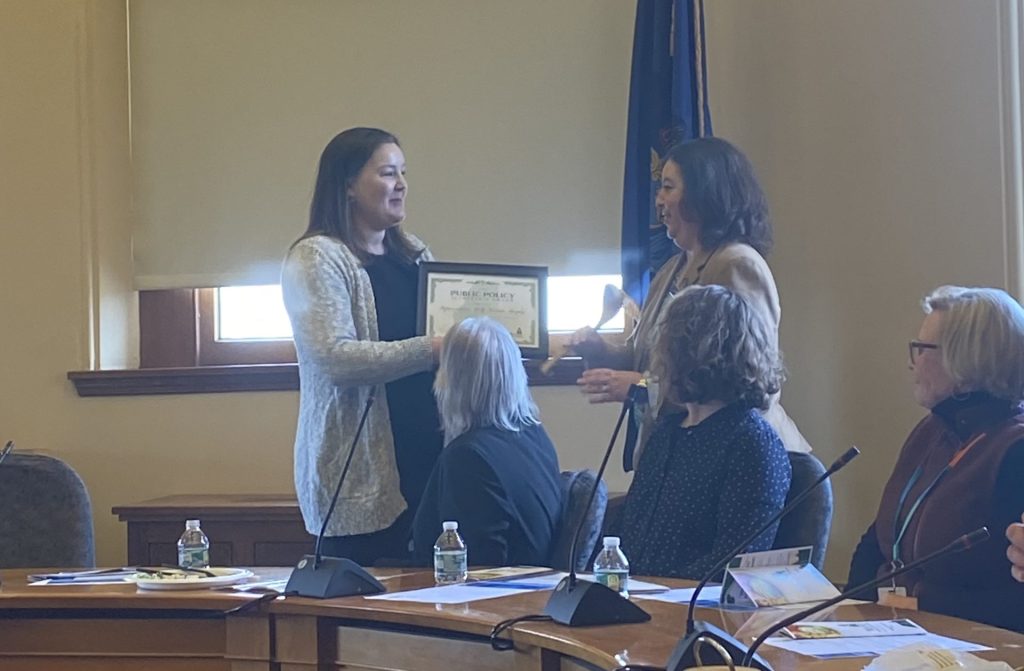
The Maine Academy of Nutrition and Dietetics (MAND) Public Policy Panel (PPP) has had another exciting year of advocacy. Below are highlights of this year’s activities, and we are anticipating another productive year ahead! If you’re interested in joining the PPP, contact Kayla at maineandppc@gmail.com.
Reintroduction of the Medical Nutrition Therapy Act of 2023
Both MAND and the Academy of Nutrition and Dietetics are excited to share that the Medical Nutrition Therapy (MNT) Act of 2023 was reintroduced in early November by Maine’s Senator Susan Collins. The MNT Act would increase Medicare Part B coverage for medical nutrition therapy for multiple diet-related conditions. Additionally, the MNT Act would authorize the Secretary of Health to include other diseases based on medical necessity and allow multiple providers (including nurse practitioners, physicians’ assistants, clinical nurse specialist and psychologist) to refer patients for MNT. Leading up to the reintroduction, members of the Public Policy Panel worked diligently to spread the word, with press releases sent to multiple news outlets. Also, Rebecca Maclean, Marcy Kyle and Kayla Parsons attended a meeting with Senator Angus King’s staffers to advocate for the MNT bill, which was received positively.
Dietetic Licensure Compact
MAND’s PPP continuously works to advocate for the dietetic licensure compact for RDNs. Our aim is to introduce the dietetic licensure compact in the next legislative session. The compact will allow RDNs to have licenses in multiple states, without enduring the traditional, strenuous process of applying for multiple licenses per state. This is specifically beneficial for those in the military or military spouses, or RDNs with clientele across the nation. To keep up to date on all information, both MAND’s state policy representative and the public policy coordinator have attended monthly meetings regarding licensure held by the Academy of Nutrition and Dietetics.
2024 Legislative Event
During National Nutrition Month, on March 14, 2024, the PPP held a legislative luncheon at the Augusta State House. This event focused on building connections between RDNs and representatives, as well as the role of the RDN in rural healthcare, featuring an expert in the field, Eileen Molloy. We were also honored to announce this year’s Public Policy Leadership Award to Representative Kelly Murphy-Noonan. Representative Murphy-Noonan has advocated for the health of the public through sponsoring and cosponsoring several bills which promote perinatal health. We consider this event a great success, as multiple dietitians and dietetic technicians, registered across the state of Maine were able to connect with their local legislators.
Congratulations to Maine Academy of Nutrition and Dietetics (MAND) Conference Awardees from The University of Maine!

Outstanding Dietetic Student of the Year – Graduate Student: Kayla Raymond 
Outstanding Dietetic Student of the Year – Dietetic Intern: Emalee Harrington 
Outstanding Dietetic Student of the Year – Undergraduate Student: Lydia Roy 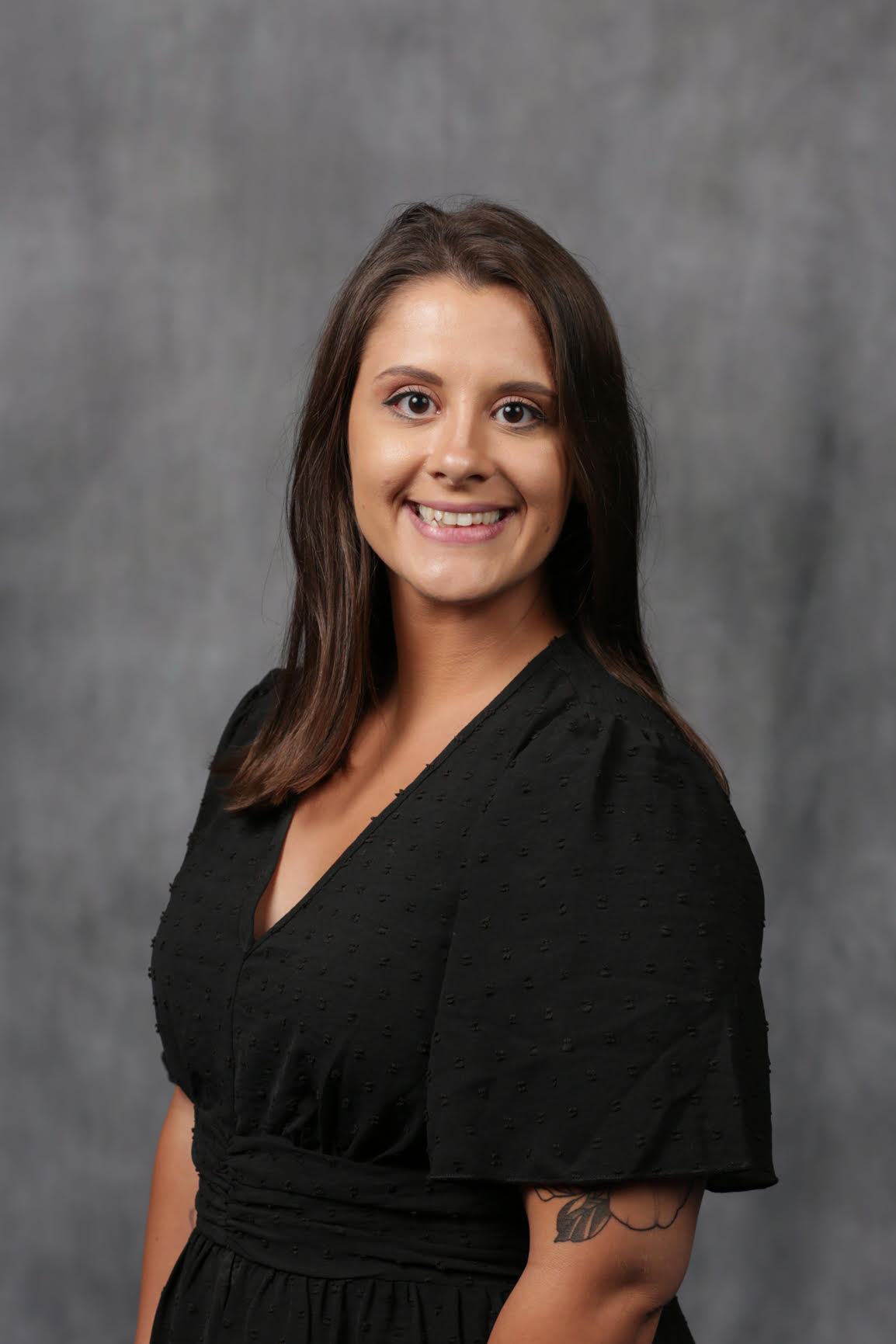
Outstanding Dietetic Student of the Year – PhD Student: Kayla Parsons 
Recognized Young Dietitian of the Year: Leigh Neptune
Alumni News
(listed according to program start date)
Class of 2006
Anna Bullett is the Senior Director of Health & Nutrition Programs at The Opportunity Alliance (TOA). She has been employed at TOA for almost 8 years and enjoys supervising a diverse team of 16 highly skilled food, nutrition, lactation, and social service professionals. In the spring of 2023, her team was awarded a $706,000 federal grant to fund an innovative data-access and intergraded WIC service delivery model at Maine Medical Center. In November of 2023, Anna was elected to the Portland City Council. She is serving a three-year term representing District 4, which includes the Back Cove, East Deering, and part of Deering Center neighborhoods.
Class of 2007
Elijah Magrane started a new position at the beginning of the year as director of product development for a food and supplement company, NativePath. The company prioritizes health and wellness and prides itself on promoting whole foods, movement, and mindfulness. Elijah was charged with building out and leading their product development team. He says, “it is my dream job!” Elijah hopes everyone at UMO is doing well and gives a shout-out to the DI class of 2009.
Venus Gilley, MS, RD, LD, CDCES, retired in March of this year from MaineGeneral Diabetes and Nutrition Center where she has held a position as a registered dietitian/diabetes educator for the past eight years! Venus has worked for MaineGeneral for 12 years as a dietitian. Venus says she is enjoying retirement!
